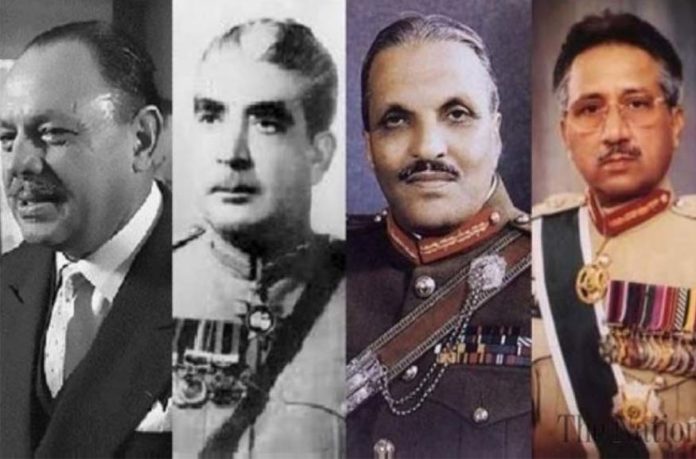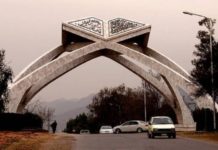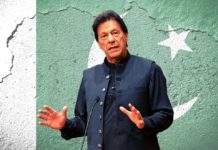Disclaimer: The Eqbal Ahmad Centre for Public Education (EACPE) encourages critical and independent thinking and believes in a free expression of one’s opinion. However, the views expressed in contributed articles are solely those of their respective authors and do not necessarily reflect the position or policy of the EACPE.
Pakistan is in a permanent state of martial law as written by famous Marxist sociologist Hamza Alavi. The brief democratic interregnums are aberrations in the authoritarian politics of Pakistan. The failure of national leaders in post-colonial era further prolonged colonial rule through ‘dependency’ on imperial metropolitan power.
With the onset of colonialism, the traditional relations of forces and relations of production were transformed in fundamental ways. It paved the way for capitalistic transformation of societies. It destroyed indigenous system of modes of production resulted into the capitalistic agricultural relations and embourgeoisement of urban societies. At social level, it created a new class of landed aristocrats and petty bourgeoisie. In this process Punjab, the granary of Sub-continent, became the epicenter of colonial machination to uphold their rule over in the North-West parts of South Asia.
Industrialization under colonial rule, on one hand, favours passivity on the part of industrial and agricultural relations and, on the other hand, results into a class consciousness. This contradictory phenomenon gave rise to nationalistic leaders—a byproduct of modernization in colonial India—who steered the nationalist movements for independence from colonial rule in the twentieth century. But the subsequent developments in post-colonial era brought in a new form of colonialism, neo-colonialism.
Pakistan could not escape this colonial phenomenon. It embraced the umbrella of U.S. security alliances to thwart perceived threats from India and to provide yeoman services to its masters in Washington for purely strategic reasons. Global security systems backed by the U.S. gave rise to military dictatorships and military classes in decolonized states after the World War II. The role of military in politics increased in the Cold-war era. It took deep roots here too.
The current predicament of Pakistan is through ‘dependency paradigm’ can depict how institutional authoritarianism are closely related with political developments and governing structures of the state. In Marxist tradition, dependency theory was propounded by P. A. Baran in 1950s. He argued that economic development of industrialized rested on expropriation of an economic surplus from overseas societies.
This theory was further elaborated by A.G. Frank, who analyzed societies’ underdevelopment in terms of dichotomy of center/periphery relations. This relation is marked by global network of exploitation between metropolis and satellite societies. In the center/periphery relations, center refers to loci of political, military and economic prowess at international level. Political and trade arrangements are important tools to develop international political economy. Military alliances secure strategic interests of dominant center through web of peripheral regions world-wide. The theory describes how the backwardness of peripheries is held to be a consequence of their dependence on various core economies and not the effect of their poor resources, illiteracy, traditionalism or political instability. This relationship affects not only the economic systems, but also the political developments in peripheral states.
These peripheral states, of which Pakistan is also an important member, lack a consistent and pronounced ideology. However, its origin lies in a pervasive ideological environment which favours national security state. The doctrine of national security state has its roots in institutions and policies associated with the Cold War. Ironically it is nourished at the same time by seemingly opposing heritage of modern nationalism and colonialism. It views the state as absolute, the individual as unimportant. It emphasizes a continual war between freedom and oppression, stability and subversion, national security and anarchy. It does not seek mass manipulation and public control through political institutions such as parties, youth and labour organizations.
Had the leadership of Pakistan shown any signs of independence from colonial mindset, the situation might have been different.
It posits the armed forces to be, as Nelson Rockefeller wrote, a major force for constructive social change. Armed forces, secret intelligence agencies and security networks permeate the societies in these security states. ‘Construct of the Post Colonial State’ is closely related to the idea of national security are the ideological rigged notions of development and modernization. These notions tend to become the engines of legitimacy for a security state. Typically such state is committed to the economic development. But its view about development is state-oriented. It revolves around empowering the state not its citizens. Security state views development in terms of rate of growth. Growth involves concentration of wealth and power, for both are necessary for the required rate of capital formation. The model of development is simple. Thus profit=investment=growth=power.
The preferred model of development for security states favours the return to ‘free market’. But the return is always selective: it does not involve curtailment of monopoly power or of untrammeled investment incentives given to foreign investors or local elite; it does entail strict controls over wages, labour unions and prohibition of strikes. Ideological and repressive state apparatuses fuse together in security state with repressive state apparatuses having an upper hand.
A cheap labour force is primarily offered a primary incentive to capital in security state. The internal market does not expand except for luxury goods. The economy becomes increasingly export-oriented: raw materials, including fancy food products, become the primary export item. Income inequality multiplies. Any resistance to foreign interests or corporate interests is treated ipso facto as a police problem. This trend further moves the state towards more repression. The whole process distorts societies and skews political process. The first and second decade after independence witnessed these sinister developments in Pakistan.
The era of Ayub saw emergence of a powerful bourgeoisie at the expense of peasantry. The agricultural surplus was allocated to subsidize industrial sector. By the enrichment of consumptive bourgeoisie, the military regime provided lucrative markets for Western consumer products as well as transfer of excess capital to the financial institutions of the Western world.
The perpetual instability and unabated chaos have deep roots in the authoritarian structure of Pakistan’s state system. These roots were further deepened when it’s political elite decided to act as loyal stooge of Washington. In India powerful, nationalist leadership resolved to discard the structural anomalies like feudalism and center’s supremacy over diverse regions. It favoured the evolution of political process on democratic lines. Despite low growth rates of 4 to 5 percent of GDP for last five decades, it has now become a regional hub of economic activities vying for a permanent slot in the United Nations Security Council.
Had the leadership of Pakistan shown any signs of independence from colonial mindset, the situation might have been different. The elite of Pakistan fulfill Franz Fanon’s description, which he calls ‘collaborative elite’ that collaborate with imperial powers. These elite classes are obscene. They produce nothing, but consume everything through expropriation of scarce resources from the poor. In this process they perpetuate the structure of underdevelopment. This is true about almost every Third World country and, especially, true about Pakistan.
Post-colonial analysts after Hamza Alavi, Ralph Miliband, Nicos Poulantzas and Eqbal Ahmad are now transforming the theoretical outlines into empirical analysis.
Contributed by Hammad Raza







